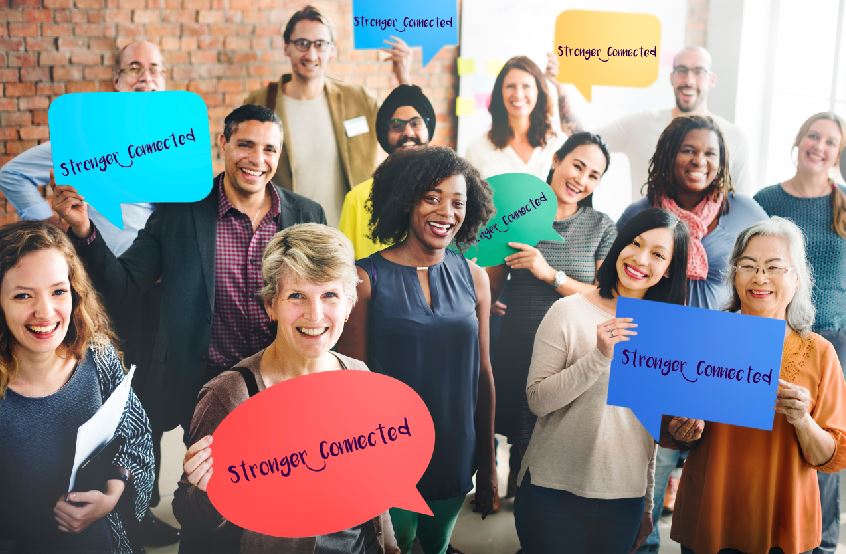Having Something in Common Creates a Connection
Not long ago, I babysat my sister’s dog, Brody. I love it when Brody comes to visit for a while because I work at home in front of a computer, and he helps me to reach my goal of 10,000 steps per day. Plus, he’s such an easy dog to take care of — truly a pleasure.
Brody & I go on several long walks in the park. Now, I’ve noticed the ‘dog phenomenon’ before, but on this visit, it was even more pronounced. When I walk alone, people rarely even look me in the eye, but when I have the dog with me they smile or say hello. On one of our recent walks, a few joggers even interrupted their run to stop and pet Brody.
People stop to talk because they feel more connected to me; they feel we share something in common — in this case, a perceived love of dogs. I seem more approachable, more “okay” and “worth” making the effort to greet. When we walk around my neighborhood instead of the park, I’m much more likely to get a smile and a greeting because we share even more in common, dogs and the neighborhood.
People make conscious and sub-conscious decisions about the value of exerting an effort toward connecting with others all the time. Teachers make decisions about whether a student is worth an above and beyond time investment. Physicians make decisions about whether a patient is worth a specific type of care. Colleagues make a decision about whether it’s worth their time to get the opinion of a friend or acquaintance.
How About that “Human” Connection?
One might ask, how can we make that worth decision if we haven’t taken the time to get to know someone? Part of being “trauma-aware” is making the investment necessary to enable us to embrace the humanity in others, particularly those unlike ourselves, long before we even meet that individual. It’s about giving a person the benefit of the doubt whether they have a dog on the leash or not. It’s about understanding that you already have a connection because that person shares something we all share, humanity. It’s what unites us, and how we engage with others matters — a smile when someone is having a difficult time, a hand when someone is unsteady — versus a frown or a head turned away.
My guess is that you have a story about a positive connection you made with a neighbor or a friend that had an impact on your day or your life. What if that positive was multiplied by hundreds — by thousands. To learn more about the kind of connections we are talking about, check out connectionsmatter.org.
Why We Held a Networking Event
The Thriving Community Collaborative’s (TCC’s) recent Stronger Connected networking event was initiated in response to TCC members’ request for an event that would enable them to get to know each other better. They recognized the value in getting to know others who were invested in helping Baltimore’s communities thrive by understanding and practicing trauma-aware principles. Several members expressed a desire to be able to make recommendations about practitioners for training or healing, but felt the need for a more personal connection to feel more comfortable in their choice. They understoond that they are “stronger connected”.
We had a great time getting to know each other a little better as well as getting to know a more about the work we are engaged in. Participants noted some successes they had observed in Baltimore such as:
- Completing the Baltimore Breakthrough Series Collaborative year-long training.
- Having a principal share that she saw that her staff “got it” and “the light bulbs came on” when we facilitated a Professional Development on trauma informed care. She wants more.
- Seeing city schools begin to focus on providing training and resources to employees regarding trauma-informed practices.
Attendees at the networking event also highlighted some of the things we still need to learn about as well as challenges facing Baltimore that still need to be addressed including:
- systemic oppression
- structural racism
- better support services for LGBTQ youth
- more ‘relatable’ resources for youth
- better meeting ‘youth-specific’ needs
Consider Contributing to ThriveBMore.org
The other reason for the networking event was to introduce our re-designed website, thrivebmore.org to a greater audience. The website was created to serve as a nucleus of activity and information for organizations and individuals in the Baltimore metro area engaged in the work of helping individuals, families, and communities thrive. We’ve begun with an examination of what it means for communities to thrive as well as an exploration of some of the basic tenants of a trauma-aware approach, and from here the website will go where our community leads us.
We hope you will visit regularly. We hope you will decide to contribute a blog article or suggestion. We hope you will choose to partner with us or foster a connection with someone else in your community — to do something to help them thrive — to do something to help alleviate the multiple stresses we all face as members of this human race. We hope you will share the link with your friends and colleagues. We hope you will learn as much as you can about trauma, it’s universality, how it impact us and how we can heal from it.
If you have some time on your hands, check out the film “Human,” or if you only have a couple of minutes check out some of the shorter segments. In this film, artist, Yann Arthus-Bertrand explores what it means to be human through stories from people around the globe. I think it speaks to the universality of the human experience. Here’s a link to Part 1.


